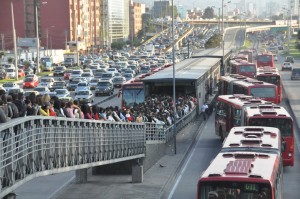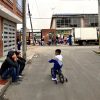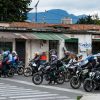World Urban Forum 7, Medellin, Colombia – 2014 – Workshop (April 9th, 4-6pm)
Taking advantage of the concentration of national and international urban planners as well as urban policy makers and practitioners in Medellin during the World Urban Forum, this workshop aims to examine these urban policies in order to look at concrete timelines: the story behind the success.This informal workshop will examine key aspects of Bogota and Medellin’s urban policies through a participative session that will attempt to identify key moments in time in an attempt to define what made them successful. The workshop will also address the question of best practices in international development policy today, what defines them, how they come about, how they are transferred and then work, or fail.
(more info to come soon)
Background
The names of cities such as Bogota and Medellin in Colombia (and others such as Curitiba in Brazil) are often invoked as totems of urban regeneration by urbanists and policy experts around the world. However, this is often done without a critical understanding of the precise transformations that has taken place in these cities, interactions between different policies, their underlying agendas and of course, their outcomes: what worked, what didn’t work, what is myth, what is fact.
The thrust of our enquiry will look at how the success stories of these cities, largely brought about through transport oriented “quality of life” and “security” agendas, can be examined in the context wider «sustainability» and «urban pacification» agendas. On one hand we aim to look at how the success factors of these implemented policies are related to the intertwined relationships between these two local, but also worldwide policy agendas; on the other, we examine and aim at unpacking the notion of «best practices» and how the interlocking nature of the aforementioned agendas could possibly blur policy results, and possibly to what extent they could be applicable in other contexts.
Key Questions
We hope to tap into the experiences of both local and international policy professionals present at the WUF so that our enquiry is interdisciplinary but also international in scope. We hope that the workshop will mix local and international policy professionals, thus enriching both Colombian and international knowledge bases and encouraging critical viewpoints on both policy spheres.
– Would policy success stories be as successful in contexts where violence and urban unrest were not already present?
– What does the dichotomy of the crack-down in gang activity and the promotion of holistic urban development bring about in terms of tangible results?
– Could one even argue that the violence experienced in these cities was a necessary precondition
for these policies now known as “best practices”?
– What were the elements that actually «worked» ?
– How can we distinguish urban pacification policies from sustainability processes?
– What were the successful elements (policy/economic/social) that drove urban regeneration in Bogotá, Medellín?
– Why are there “hyped-up” versions of what happened in those cities?
– What elements are left out of the stories behind regeneration that could be useful lessons-learnt?
– How have the regeneration policies evolved ? Have opinions matured or policies «aged»?
– How could a better understanding the cities’ actions help us to understand what a “best practice” actually is? And what the keys to success might be?









Comentarios recientes